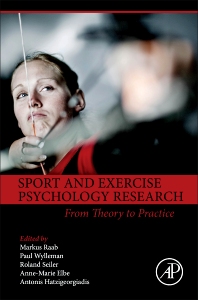LIMITED OFFER
Save 50% on book bundles
Immediately download your ebook while waiting for your print delivery. No promo code is needed.
Sport and Exercise Psychology Research: From Theory to Practice provides a comprehensive summary of new research in sport and exercise psychology from worldwide researche… Read more

LIMITED OFFER
Immediately download your ebook while waiting for your print delivery. No promo code is needed.
Sport and Exercise Psychology Research: From Theory to Practice provides a comprehensive summary of new research in sport and exercise psychology from worldwide researchers. Encompassing theory, research, and applications, the book is split into several themed sections. Section 1 discusses basic antecedents to performance including fitness, practice, emotion, team dynamics, and more. Section 2 identifies factors influencing individual performance. Section 3 discusses applied sport psychology for athletes and coaches, and section 4 includes approaches from exercise psychology on motivation and well-being. The book includes a mix of award winning researchers from the European Sport Psychology Association, along with top researchers from the U.S. to bring an international overview to sport psychology.
Researchers in exercise and sport psychology.
MR
PW
RS
AE
AH